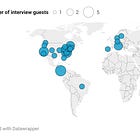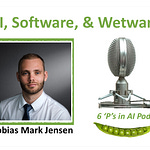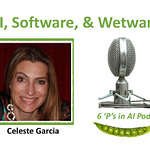Introduction - Chris Dalla Riva
This post is part of our 6P interview series on “AI, Software, and Wetware”. Our guests share their experiences with using AI, and how they feel about AI using their data and content.
This interview is available in text and as an audio recording (embedded here in the post, and later in our 6P external podcasts).
Note: In this article series, “AI” means artificial intelligence and spans classical statistical methods, data analytics, machine learning, generative AI, and other non-generative AI. See this Glossary and “AI Fundamentals #01: What is Artificial Intelligence?” for reference.
Interview - Chris Dalla Riva
I’m delighted to welcome Chris Dalla Riva today as my guest on “AI, Software, and Wetware”. Chris, thank you so much for joining me on this interview! Please tell us about yourself, who you are, and what you do.
Yeah. Thanks for having me. I'm happy to be here. I'm from northern New Jersey. I have degrees in economics and math from Boston College. I spent a couple years after graduating working in economic consulting before I found my way to working in the music industry at a company called Audiomack1.
Audiomack’s a global music streaming service. At this point, we have, like, 30 million monthly users. For those unfamiliar, it's more in the universe of, say, SoundCloud than Spotify. What I mean by that is, as with SoundCloud or YouTube, people can upload directly to our platform, and we're not a full service catalog. So you go on Spotify. You could search basically any piece of recorded music in the last 100 years, and it'll be there. We focus on specific genres, though our catalog is expanding.
I was first hired there as a data analyst as they were growing rapidly and generating tons of data and needed someone to crunch the numbers around basically everything. I got dragged into anything quantitative, whether that was product performance, A/B testing, ads, or user acquisition funnels, before I transitioned to our product team with a focus on data, but also personalization.
I've been there for about 5 years now. And with our development team, we've built out a slew of algorithmically-driven music recommendation sections through our apps and website. And we built an in-house analytics platform that I think informs decision-making for most of our company.
So that's the ‘Cliff Notes’.
Great. That's a great summary. It's really neat that you have that background in understanding both the music industry and the data aspects, analyzing data and personalization. So I'm really curious to hear more about your level of experience with AI and machine learning and analytics, and how you’ve used it professionally or personally, or if you studied the technology.
I definitely live at, I think, an interesting intersection of things, because my initial draw to music was I like to make music. I still play actively in bands out of bars and little venues. I still record music. Search my name on any streaming service, it's going to come up.
But I've also always had this quantitative interest. And this job allows me to bring those two things together. My biggest exposure to machine learning is, again, as I mentioned in the previous responses, through the various personalized sections on the Audiomack app and website. We have songs for you, playlists for you, personalized search results, all that stuff. These sections are powered by both collaborative filtering and content-based filtering. We're generating most of our recommendations through those two lenses.
And one of our biggest things that we work on in terms of machine learning and personalization is the ‘cold start’ issue. It's something that everyone who works in this field deals with. But how can we get the music that you want to listen to, to you as quickly as possible, when we know very little about you? That's something we think about almost every day. I mean, I don't think there's a perfect solution, but we've come up with something.
And outside of my day-to-day at Audiomack, I've certainly played around with the various generative AI audio tools that have cropped up over the last few years. So I'm pretty well versed in topics related to generative AI, music, intellectual property, and the music industry, but I haven't been involved in building anything related to those.
Thanks. That's a good explanation. I suspect some of our audience doesn't know collaborative filtering and content-based filtering and what those mean. Could you share a little bit more about that?
Totally. In the abstract, these are 2 different ways that a machine can recommend music, but they're very similar to, I think, how people recommend music. So content-based filtering would be something like, “Oh, you like punk music? Here's this other piece of punk music. I think you'd enjoy this.”
So it's very dependent on tagging music with accurate metadata. That's a really hard thing to do at scale, especially when we have hundreds of thousands of uploads per week. And often we're relying on users to tag things. People often think the music they make is different than what a listener would perceive it to be. And sometimes they just don't provide enough metadata to make that useful.
So the other approach, again, that I still think is analogous to how humans recommend music is collaborative filtering. This isn't reliant on metadata at all. It might be something like: “Okay. There's someone who comes on to our app. They've listened to Bruce Springsteen and John Mellencamp. Let's find everyone else that's listened to both Bruce Springsteen and John Mellencamp and see what else they've listened to, and recommend that to them. Say, those people are also listening to Bob Dylan. Let's kick that back to that person.”
The advantage of collaborative filtering is that it doesn't require any metadata. All of the associations are implicit, whereas the content based filtering models are all explicit. Things have to be tagged.
Now there are pros and cons to both of these models. Again, in our case, collaborative filtering is really nice. You don't have to tag anything explicitly. All those connections can just be inferred by the model. The downside is for new music. So if you have a new song by an up and coming artist that has no plays, we don't know who to recommend that to, because we don't know anything about it. So in that case, the content-based filtering is helpful. If something is tagged as R&B or drum & bass, it might make it a little bit easier to recommend that new music. The nice thing about collaborative filtering, though, is at scale, sometimes with just a couple of plays or a couple of interactions, it can start building connections within our web of music.
But, yeah, these are ways computers, I guess, recommend music. But in my mind, I always think that they are somewhat analogous to how we recommend music as people.
Alright. Yeah. Thank you for explaining that. I think that'll be helpful for people that are listening or reading this.
This is mostly your professional use and familiarity with AI and machine learning. Do you have any personal experience, or have you ever studied machine learning? You've taken any new courses and prompting or anything like that?
I never studied it directly, like, in a classroom setting. All of my exposure has just been in my day to day at work. I mean, AudioMack is a small company. When I started, we were about 20 people. I think we're close to 50. User wise, when I started, I think we were maybe 2 or 3 million daily users. Now we're over 10 million. So it's grown a lot, but when you're that small and scrappy, you just sort of have to figure things out.
And we don't build everything internally. We've worked with external contractors. But it's a lot of just learning things on the fly and trying to figure things out within your constraints, whether that be budgetary or just time-wise.
Can you share a specific story on how you've used a tool that included AI or machine learning features? I'd like to hear your thoughts about the AI features of those tools and how well they worked for you or didn't.
Like everyone else, I use generative AI chatbots, something like ChatGPT, in my day-to-day work life. My usage, I think, is pretty specific. It's usually related to SQL-related questions. I guess, for those unfamiliar, SQL is just a way to query databases. And ChatGPT is fantastic for these little coding quandaries, I guess.
Outside of work, I write a newsletter. And I’ve found ChatGPT, Claude, and the various Google-related chat bots to be okay for research. One nice thing about Google Bard (or whatever they call it now) is that they try to provide sources. So sometimes it's a good way to find sources, but I don't find I use it in that context as much. With my newsletter, I've used Otter.ai to transcribe interviews. I think it's a fantastic product.
And as a musician, I've experimented with various AI generated audio technologies. You know, the most popular is Suno, which is a generative audio company. Suno is a miraculous piece of software. I could go in and say, “make me a 90s R&B song about, I don't know, a sandwich”, and it will spit something back that is relatively accurate.
I think there are tremendous issues surrounding that technology, but it's cool. I think once those issues are sorted out, it's going to become part of the creative toolbox for a lot of artists.
A good example, I think, I heard someone using it like this. They would prompt Suno for some sort of audio. They would then export that audio and put it into a stem separator. So these are also AI-driven technologies that will say “Here's one single audio file”. Using AI, they can pull out, “Oh, here's just the drums. Here's just the guitar. Here's just the vocal.” With those things separated now, a producer can take that AI-generated song and chop it up, move it around, turn it into something completely new.
That stem separation technology, I think, is less fraught with intellectual property issues. And it's been pretty magical, especially for recovering older files. They used this in the Beatles documentary that came out a few years ago. They were able to separate everything that was recorded and create these beautiful, very contemporary-sounding new master recordings of the audio that, a decade ago or even 5 years ago would not have been possible to get that audio fidelity. That technology is really exciting.
The generative audio technology like Suno, I think, is also exciting, but I think that's much more fraught with issues surrounding intellectual property and copyright infringement, and there's going to be years of battling before we see how that shakes out.
Yeah. The stem separation and the ability to clean up old audio is really interesting. You've probably heard the story about the tape that John Lennon's widow gave to Paul McCartney, and they cleaned it up, and they were able to recover the song from that. And then there are other musicians like Randy Travis, who was able to continue his career even though his voice has been damaged by health problems, and he's been able to use AI technologies to help him. But that's where the people themselves are in control of how the AI is being used, for content that's really already theirs.2
So, like you're saying, I think that's where a lot of people get caught up in saying, we're using it for stem separation. Okay, it learned what drums were. People are okay with that ethically. But then when you start talking about it generating whole new songs or pulling snippets of songs that are clearly identifiable or where the producer's track tag is still right there. And I think that's part of what underlies the lawsuits against Suno and other music AI tools.
Yeah. The stem separation stuff is really, really cool. Every musician, if you have an iPhone or even if you have an Android, you always are recording ideas just into the voice memos app. And sometimes they sound really crappy or grainy. The fact that we now have technology that's built into a lot of standard recording software that can just pull out your vocal or whatever, get rid of all that grain, I think that's really exciting.
You've talked a lot about ways that you've used different AI-based tools, including Otter.ai for the transcription, and other features for your music. Are there any cases where you avoided using AI based tools for some things, or for anything? Can you share an example of a case like that where you chose not to use an AI-based tool?
I think there are multiple scenarios where I wouldn't use it. So like I said, my main use case for ChatGPT in my day-to-day is solving little coding questions.
Most of my coding knowledge, whether that be in SQL or Python, is self taught or I've learned on the job. So I'm not a developer in any sense. So it's really helpful to have something like ChatGPT to help you when you get stuck. I usually try to figure something out before immediately turning to ChatGPT, because I find I end up grasping what's actually going on a bit better.
So that's one piece where I avoid it to a degree, but I'm happy to use it when I am actually stuck. With generative audio technology, I'm much more cautious. Part of the fun of making music is there is a level of difficulty to it. And when you just sit down and you type in “eighties rock song that sounds like Van Halen”, I don't know. I mean, it's cool, but it doesn't make me feel the same way as if I'm sitting down with a guitar or playing with a band. It takes a little bit of the fun out of it.
I don't think that means it'll never be used. I do. There's no way it's not going to be used. But I avoid it partially because it's not as enjoyable. But also, Suno has readily admitted that they basically trained their models on every piece of recorded music that is available. And that's bad. You have to be able to compensate people for this. And I know the legal landscape around this is still evolving. But there is a long legal history of recorded music and compositions being protected. So I don't see any way where they don't end up having to compensate artists.
It's frankly just sort of ridiculous. And I'm saying this as someone who can see value in these tools. But I've heard people joke,
“If you steal one song, it's copyright infringement.
If you steal them all, it's fair use.”
The way I also think about it is, would Suno want people using their intellectual property without consent? I don't think so. I would imagine they would sue people, and it's like you can't really have it both ways. You have to respect intellectual property to some degree.
And, you know, certain things like ChatGPT pulls a bunch of stuff off random forums and Reddit. Alright, I mean, there are still some ethical questions there, but I think it's less of a legal gray area.
Whereas, again, we have this long, robust legal tradition of music being copyrightable and protectable. I think it's ridiculous, as an artist, and I just don't see how they don't end up compensating people for training on their music, but also with some sort of royalty model. I don't claim to know how it would work, but I don't understand how it would end up any other way. And if it did, I would think it was frankly ridiculous.
Yeah. We've pretty much covered what was going to be my next question, which is how you feel about companies that use data and content for training their AI and ML system and tools, and whether you think that artists are entitled to the 3C's, the Consent, Credit, and Compensation? 3
It feels like there's kind of, as you were describing, there's a case where somebody posted something in a public forum. Maybe they don't necessarily have full rights to that content because it was in the terms and conditions of the site that they used. But in cases where someone's making a creative work, like a piece of music, and we have a very well established tradition and legal system that says that that is copyrighted to someone.
Yeah.
Or if they've published a book, and look at all the books that were scraped - that's different cases. And I think it's pretty clear-cut. And most of the people around the world, the surveys I've seen and the people that I've talked to, everyone pretty much agrees that, yeah, that needs to be protected.
How we actually make it happen is another question.
Yeah. Sadly, that's above my pay grade. I don't know how to make that work.
25 years ago, when the music industry went through the whole Napster fiasco, their first response was, “Alright, let's just try to sue everybody out of existence”. They sued companies. They sued random people who were ripping things off of Limewire. Of course, it did not work. Revenues kept collapsing. The iTunes store and all these digital music stores didn't stem the bleeding. It was music streaming that did that, and people have various qualms around streaming and artist compensation. But at a macro level, it did turn the fate of the music industry around.
I think the industry has a different perspective this time through, where they're like, “Alright, genie's out of the bottle. We can't pretend this doesn't exist, but we have to set up some sort of model where artists, labels, songwriters can get compensated, and have to consent to their usage.” I don't think that's far-fetched.
As someone who has used AI-based tools, do you feel like the tool providers have been transparent about sharing where the data used for the AI models came from, and whether the original creators of the data did consent to its use?
Absolutely not. I know there are certain people who are trying to create a situation where we're able to see where this information is coming from, what it was trained on. None of the most popular tools seem to have gone that route. It seems more like, “let's ask for forgiveness rather than permission”.
Google, I think it's called Gemini now - I think I mentioned earlier, they seem to try to link to sources. This is with their text-based model. It's certainly not always clear. I think there's definitely a long way to go on that front.
Yeah. I just saw something on LinkedIn today. Someone with IBM posted that they were coming out publicly and stating “This is where we got the data that we use for training our models”. 4 And it's kind of unprecedented that they're actually doing this, a company of that size.
The other thing that we've seen is the Fairly Trained companies, and some of them are in the music area. And I had done an article about them earlier this year.5 They are making sure that the data that they use for their music tool is ethically sourced. They paid musicians to generate it, or they've taken other approaches to make sure that it's ethical, and then gotten that certification. You don't need the certification to be ethical, but it's an interesting step for the companies to take. That, at least, I think, is a positive sign.
But the whole data provenance, and how do you actually trace that, when someone uses Suno to generate this song that it pulled up this clip that you, Chris Dalla Riva, had created 5 years ago? That part is hard. But, you know, AI is already hard. I don't think this data provenance is necessarily harder. There just hasn't been an incentive, a financial or ethical incentive, for the companies to do it, and so they haven't. But that's where I think we need to have some changes.
Totally. Yeah. It's certainly a hard issue. Sometimes it's like, oh, I was listening to this Chuck Berry song or whatever, and I got this idea. But most of the time, the human creative process, it's a mishmash of ideas percolating in your brain. And I think there is some analog there to how these models work, which makes it tricky.
But like you said, there hasn't really been an incentive to solve it. And if there were good incentives to solve that issue, I'm sure we have people smart enough out there to do it.
Yeah, definitely a lot of smart people working in this area. It's more a matter of will than capability, I think.
Yeah.
In the other parts of your life, do you know of any company that you gave your data or content to that made you aware that they might be using your info for training AI or machine learning? Or have you gotten surprised to find out that they were?
I've thought about writing about this before. It's not really in my wheelhouse, so I haven't done it. But there's this falafel shop in the town that I live in, and they have these kiosks that you can go up to and order at. Of course, they're convenient. You just click a few buttons.
And I noticed there's a camera at the top. It's so weird. Why do they have a camera? And then I started noticing as I went up there, it was clearly trying to recognize who I was, and spit back what I had ordered in the past, or recommend some sort of order based on who I was.
So when I went up to it once, I noticed, of course, the little terms and conditions on the bottom of the screen before you click start. And it had all these things that was just insane, like, “We can use your data to train various models” and x, y, and z. And, of course, I don't remember exactly what it said completely. But I was like, “I'm just trying to order a falafel sandwich here”. I mean, this is so ridiculous.
Technically, I guess there is a way to opt out - like, there was something you could turn off there. But it's like every time I go up there, I'm going to have to opt out again and again and again? It's just so absurd.
And I feel like that's a good example of us trying in various places to just collect data and try to, like, put an AI name on it, because it's so en vogue right now, where I don't think that particular case was solving any issue. I mean, it takes, like, 3 clicks for me to order what I want to.
This is the most egregious example I've come across where I'm like, who knows what they're using the picture of my face for or what I'm ordering?
Right. I'm impressed that you actually read the terms and conditions because there was a recent study that 91% of people never read the terms and conditions. So that's quite interesting that they are using cameras. That definitely seems like using a sledgehammer to kill a gnat.
Yeah. I was like, come on. And I'm sure the business, the place that I go to, they just want these self-order kiosks. They're probably not thinking about it too hard. It's just craziness.
Yeah. And it would be one thing if your picture and the data about you stayed only with that one falafel shop. But it's another thing if the people that make the kiosks are combining that with data from people all over the world, and your data's going - who knows where, right?
Exactly. Yeah.
Did you opt out and place an order? Do you still go to that shop? What do you do?
Oh, I still go. You can still order at the counter.
With all of that, it's pretty clear why public distrust of AI and tech companies has been growing. I think it's actually healthy, because people are more aware of what's happening with their data, and they're saying, “Wait, no, this is not okay with me”. What do you think is the most important thing that an AI or tech company would need to do to earn and keep your trust? And do you have specific ideas on how they can do that?
Yeah. I mean, you alluded to this before. Especially in places where there is a long tradition of copyright and intellectual property rights, you should be able to consent to have your copyrighted materials used for training. And then you should be able to be compensated if they're monetizing that model in some way.
Again, I don't know specifically how that would work because I've never been involved in building these models, but it really just does not seem far-fetched. My ideas aren't as clear for things where the intellectual property is not as clearly defined, like you mentioned earlier, some public blog online. But in terms of a space where we have intellectual property rights established, it seems like a no-brainer.
Is there anything else that you'd like to share with our audience today?
Not really. You can find me on Substack at “Can't Get Much Higher”. I talk weekly about the intersection of music and data. That’s where I am.
Alright. Well, thank you so much, Chris, for joining the interview with me. I learned a lot from you, and I thank you for making the time.
Yes. Of course. Thanks for having me.
Interview References and Links
Christopher Dalla Riva on LinkedIn
Chris Dalla Riva on Substack (Can't Get Much Higher)
3 recent articles by Chris on musicians and compensation:
About this interview series and newsletter
This post is part of our 2024 interview series on “AI, Software, and Wetware”. It showcases how real people around the world are using their wetware (brains and human intelligence) with AI-based software tools or being affected by AI.
And we’re all being affected by AI nowadays in our daily lives, perhaps more than we realize. For some examples, see post “But I Don’t Use AI”!
We want to hear from a diverse pool of people worldwide in a variety of roles. If you’re interested in being a featured interview guest (anonymous or with credit), please get in touch!
6 'P's in AI Pods is a 100% reader-supported publication. All new posts are FREE to read (and listen to). To automatically receive new 6P posts and support our work, consider becoming a subscriber (it’s free)!
Enjoyed this interview? Great! Voluntary donations via paid subscriptions are cool; one-time tips are deeply appreciated; and shares, hearts, comments, and restacks are awesome 😊
Series Credits and References
Audio Sound Effect from Pixabay
For details on the Lennon tape, Randy Travis, and other cases of musicians using AI, see:
LinkedIn post by Armand Ruiz of IBM, ~2024-11-10 (disclosure of full list of datasets used to train IBM LLMs Granite 3.0)











![Musician-led AI initiatives [Unfair use? series, Part 3] 🗣️](https://images.unsplash.com/photo-1593697972679-c4041d132a46?crop=entropy&cs=tinysrgb&fit=max&fm=jpg&ixid=M3wzMDAzMzh8MHwxfHNlYXJjaHwyMnx8bXVzaWMlMjBjb21wdXRlcnxlbnwwfHx8fDE3MjAzMDk0NDJ8MA&ixlib=rb-4.0.3&q=80&w=1080)
![9 ethical genAI music tools [Unfair Use? series, PART 3] 🗣️](https://substackcdn.com/image/fetch/$s_!dPys!,w_140,h_140,c_fill,f_auto,q_auto:good,fl_progressive:steep,g_auto/https%3A%2F%2Fsubstack-post-media.s3.amazonaws.com%2Fpublic%2Fimages%2F91c8b468-57fd-4baa-b87f-dc36aff28175_1920x1275.jpeg)









